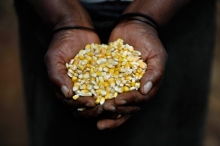Food Price Volatility in ACP countries focus of top briefing
 Brussels, 28 November, 2011/ CTA/ ACP Newsdesk: Price volatility is one of the most critical economic and food security challenges facing global policymakers today. Spikes in food prices can have significant impact on incomes, markets, and nutrition worldwide, particularly in ACP countries. The monthly Brussels Development Briefing will be held this Wednesday 30 November, to discuss food price volatility for ACP countries and review the results of the recent G20 Summit in Cannes. The briefing will provide a dialogue platform to feed into the policy debate for the G20 in Mexico11.
Brussels, 28 November, 2011/ CTA/ ACP Newsdesk: Price volatility is one of the most critical economic and food security challenges facing global policymakers today. Spikes in food prices can have significant impact on incomes, markets, and nutrition worldwide, particularly in ACP countries. The monthly Brussels Development Briefing will be held this Wednesday 30 November, to discuss food price volatility for ACP countries and review the results of the recent G20 Summit in Cannes. The briefing will provide a dialogue platform to feed into the policy debate for the G20 in Mexico11.
The Briefing is organised in cooperation with the International Food Policy Research Institute (IFPRI), the New Partnership for Africa’s Development (NEPAD), the European Commission (DG DEVCO), the ACP Secretariat, the European Economic and Social Committee (EESC), Concord and various other partners.
Among the speakers are Hafez Ghanem, Deputy Director of the UN Food and Agriculture Organization (FAO), Maximo Torero, Director of the Markets, Trade and Institutions Division at the International Food Policy Research Institute (IFPRI), Mamadou Cissokho, President of the Réseau des Organisations paysannes et de Producteurs de l’Afrique de l’Ouest (ROPPA), Chris Moore from the UN World Food Programme (WFP) and others.
In recent years world food markets have been characterized by rising and more volatile prices. In extreme cases, food price volatility can have serious political and social repercussions; in the 2007-08 food price crisis, 33 countries saw violent riots and social unrest as a result of volatile food prices, while in 2011, food price spikes have been at least partially blamed for political turnover in Tunisia and Egypt, as well as riots in several other countries.
This situation has serious implications for poor and hungry people, who have little capacity to adjust to price spikes and rapid shifts. Price increases and volatility have arisen for three main reasons: increasing use of food crops for biofuels, extreme weather events and climate change, and increased volume of trading.
Understanding the causes behind price volatility, and the policy options that exist for dealing with periods of volatile food prices can significantly lessen the likelihood of policymakers engaging in knee-jerk responses.
The Briefing will take place on 30 November 2011 in the European Economic and Social Committee, 2, Rue Van Maerlant in Brussels, and focuses on food price volatility.
The Briefing will start at 12 p.m. with a networking lunch; speeches will begin at 2 p.m.
The Briefing is fully webstreamed in English and French from 1.45 p.m. until 6 p.m.; the webstream will be available through this website.
You can download the programme here
Registration is now open; to participate, please register through this website or via fax.
For more infomation, see http://brusselsbriefings.net
(Photo: FAO)
